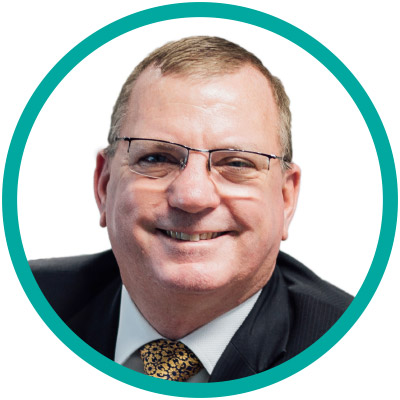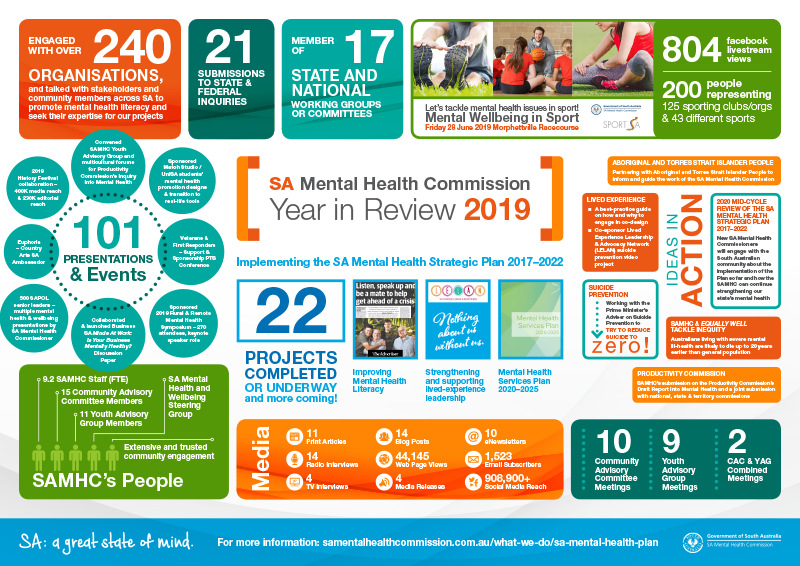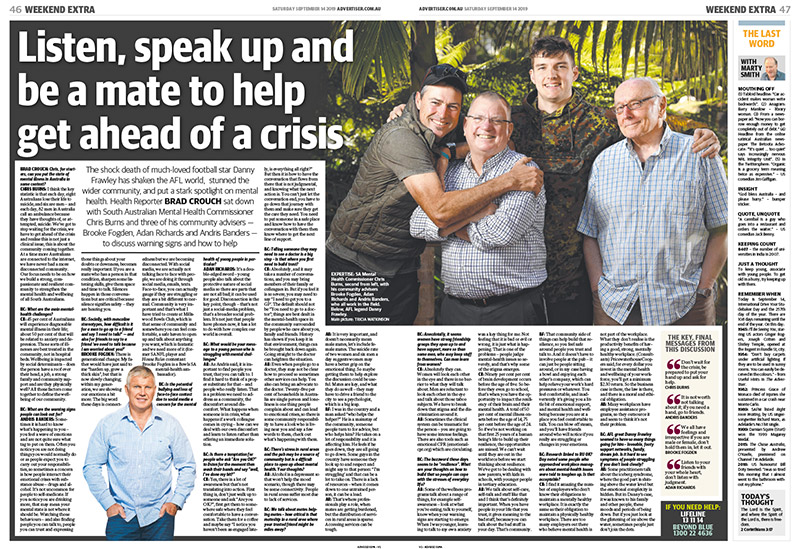The post COVID-19: Advice from the SA Mental Health Commission appeared first on .
]]>The SA Mental Health Commission recognises that people are feeling worried, stressed and anxious in relation to the coronavirus (COVID-19). These are normal reactions to a confusing and fast-changing event.
 There are many sources of information on COVID-19 available, which can also add to a sense of confusion.
There are many sources of information on COVID-19 available, which can also add to a sense of confusion.
We recommend that you choose reliable sources of information for updates on COVID-19, including one or two trustworthy sources of news. If you find yourself becoming anxious, try to check sources just twice a day as constant scrolling, searching or consumption can sometimes make you feel more worried.
Isolation or social distancing do not mean cutting yourself off from family, friends and loved ones. Think about ways you can stay in touch. In fact, we may discover or create more innovative ways to stay in touch and to care for one another – which in turn can help us build an even stronger sense of community.
Having a community-focused or outward looking focus is good for our own mental health and wellbeing.
While information will develop to keep pace with the progress of COVID-19, here are some links to keep yourself up to date.
- www.sahealth.sa.gov.au/COVID2019
- World Health Organization – coronavirus disease (COVID-19) outbreak
- Australian Government coronavirus (COVID-19) health alert
- www.smartraveller.gov.au
- www.healthdirect.gov.au
Below are some links to information which might help you work out ways you can support your mental health and wellbeing during this tricky time:
- Mental Health Coalition of SA: https://www.mhcsa.org.au/covid-19-mental-health-in-uncertain-times/
- Beyond Blue has helpful tips on how to look after your mental health during the coronavirus outbreak.
- The Australian Psychological Society has an information sheet on how to cope with coronavirus anxiety.
If you, a friend or family member are experiencing distress please contact one of the following numbers:
- Lifeline on 13 11 14
- Suicide Call Back Service 1300 659 467
- Mental Health Line 1800 011 511
- Lived Experience Telephone Support Service (LETSS) 1800 013 755
The post COVID-19: Advice from the SA Mental Health Commission appeared first on .
]]>The post Suicide Prevention Community Grants 2020-21 Now Open appeared first on .
]]>These grants empower communities by providing community groups and non government organisations with between $500 and $10,000 to deliver localised suicide prevention projects.
Click here for more information and to apply.
The post Suicide Prevention Community Grants 2020-21 Now Open appeared first on .
]]>The post Year in Review 2019 appeared first on .
]]>2019 was a huge year for the SA mental Health Commission as we continue to implement the SA Mental Health Strategic Plan 2017–2022 through our work with communities, organisations and governments.
Year in Review 2019: Download PDF [945kb]
The post Year in Review 2019 appeared first on .
]]>The post Inherent in Every Community is the Knowledge to Solve Their Own Problems appeared first on .
]]>As featured on the Australian & New Zealand Mental Health Association website:
https://anzmh.asn.au/2019/10/02/community-knowledge-solve-problems/
In all our undertakings, the SA Mental Health Commission listens to and values the perspectives of South Australians with lived experience of mental health challenges.
 As we led the development of the State’s first mental health strategic plan, South Australians living in rural and remote areas generously shared with us their views, stories and concerns. This gave us a unique insight of the issues and inequities they face due to the tyrannies distance and isolation.
As we led the development of the State’s first mental health strategic plan, South Australians living in rural and remote areas generously shared with us their views, stories and concerns. This gave us a unique insight of the issues and inequities they face due to the tyrannies distance and isolation.
Time and again we experienced examples of how, in the face of limited services, country people came together as a community and supported each other. They found local solutions which worked for them – solutions which were outside the traditional clinical models of care.
Mentally Fit EP brought their Eyre Peninsula community together when it was rocked by suicides and put remarkable safety nets in place. Mount Gambier library builds social connectedness in such a vibrant way that young mums, kids and older people regularly visit and are having a great time.
These communities remind us that success in building good mental health and wellbeing depends upon addressing the root causes rather than waiting for the crisis to happen.
Mental health and wellbeing is not solely a clinical issue. Mental ill-health begins well before someone reaches a medical service or hospital.
Rural and remote communities are so powerful with their intimate knowledge of their communities and their capacity to provide early support and build social connectedness, both important protective factors in countering mental health challenges.
Good mental health and wellbeing as well as health care should not be dependent on your postcode, how much you earn and how determined you are to get access to services.
Advice, supports and services must be matched to a community’s needs to stop mental distress becoming so severe, they seek help in emergency departments.
And who knows this better than a local?
SA Mental Health Commissioner Chris Burns CSC is a keynote speaker at the 2019 Australian Rural & Remote Mental Health Symposium.
Hear him present on suicide and self-harm prevention with his presentation Let’s Not Wait for the ‘Mind Attack’ – register today.
Click here for more information.
As featured on the Australian & New Zealand Mental Health Association website:
https://anzmh.asn.au/2019/10/02/community-knowledge-solve-problems/
The post Inherent in Every Community is the Knowledge to Solve Their Own Problems appeared first on .
]]>The post Listen, speak up and be a mate to help get ahead of a crisis appeared first on .
]]>The shock death of much-loved football star Danny Frawley has shaken the AFL world, stunned the wider community, and put a stark spotlight on mental health. Health Reporter BRAD CROUCH sat down with South Australian Mental Health Commissioner Chris Burns and three of his community advisers – Brooke Fogden, Adan Richards and Andris Banders – to discuss warning signs and how to help.

The post Listen, speak up and be a mate to help get ahead of a crisis appeared first on .
]]>The post Let’s not wait for the ‘mind attack’ appeared first on .
]]>The Advertiser recently featured my opinion piece comparing attitudes toward mental health and wellbeing with the way we practised cardiology in the 1950s.
I would like to share this with you and welcome your feedback:
“In psychiatry and psychology it is like we are practising 1950s cardiology, where you wait for a heart attack and once it happens you know what to do,” Harvard Medical School Professor Ronald C. Kessler says.
So why do we insist on waiting for the ‘mind attack’ when it comes to mental health and wellbeing? This is no more evident in South Australia where we continue to myopically look at mental health and wellbeing from an illness perspective.
Public commentary focuses on the time people with mental distress spend in Emergency Departments, the number of acute mental health care beds we have and the need for health bureaucrats to fix all mental health problems. In effect, we have an entrenched approach of looking at mental health and wellbeing from an ‘ambulance at the bottom of the cliff’ perspective.
The discrimination and stigma surrounding people experiencing mental ill-health that pervades society is undeniable. While awareness is growing and we are able to discuss more openly our experiences of mental ill-health, this awareness is not translating into action.
Mental ill-health is preventable and is not just about managing symptoms or distress. It is about building resilient, compassionate and connected communities where South Australians have access to the fundamentals of being well; a stable and safe roof over their heads, a meal on the table, supportive family, friends and community around them; something meaningful to do that builds a sense of purpose, and financial means. These are fundamental to good mental health and wellbeing.
New Zealand is leading the way internationally by establishing an independent Mental Health and Wellbeing Commission which, in part, will oversee and evaluate the implementation of the government’s ‘Wellbeing Budget’. The NZ Government is committed to embedding wellbeing into the heart of the Government’s policy-making. This will include changes to the way agencies plan, report and measure their progress while simultaneously devoting significant resources to three key areas: mental illness, child poverty and family violence.
Relying on clinicians, beds and medication to address the state’s mental health issues – is merely waiting for the ‘mind attack’ to occur.
All levels and agencies of government must be supported and educated to work with the community to step-up and prevent mental distress and strengthen the mental health and wellbeing of all South Australians.
It could not be simpler: the mental health and wellbeing of every member of the community is the responsibility of all South Australians.
Let’s focus on building a fence at the top of the cliff together and not waiting for the ‘mind attack’ to occur. By doing this we will make SA a great state of mind.
The post Let’s not wait for the ‘mind attack’ appeared first on .
]]>The post Partnering with South Australians to implement the SA Mental Health Strategic Plan 2017–2022 appeared first on .
]]>– CHRIS BURNS CSC
It’s an exciting time as we respond to the priorities identified by South Australians through the wide-ranging consultations undertaken to inform the development of the Plan.
The post Partnering with South Australians to implement the SA Mental Health Strategic Plan 2017–2022 appeared first on .
]]>The post TheMHS Conference 2018 – Submit Your Artwork appeared first on .
]]>The theme for the 2018 conference is:
Hear The Whisper, Not The Roar: Reform, Reflect and Review
We need to be mindful that each person’s mental health is different. People need opportunities to achieve their optimal level of mental health, and we all need to invest in that.
Deterioration in a person’s mental health often starts in small ways, think of these changes as whispers. Unfortunately, whispers can be missed or misunderstood. Therefore, when we hear the whispers, we need to become aware that mental health is being impacted, and we need to listen more closely to what that whisper is telling us, rather than waiting for the roar before taking action.
The concepts of mental health and mental illness have changed over the years and it is timely to use events such as TheMHS to showcase the evidence of how we reform, reflect and review the supports and services we all provide. The importance of meaningful input, both the whisper and the roar from people with a lived experience offers a unique opportunity to “reform, reflect and review” mental health at all levels.
Change occurs at such a fast pace – research, innovation, globalisation, connectivity through the web, changes in evidence based practice, and impact of stressors experienced by different groups in different places. Australia and New Zealand need to adapt to these ongoing changes and be flexible in supporting the mental health and wellbeing of our community. There is a need to reform the supports and services provided and the way these are delivered, and then to reflect on the effectiveness of these reforms.
We need to give ourselves permission to review the work we undertake as we try to meet the ever-changing mental health needs of our community.
How to Enter
To enter, please submit your entry to [email protected] and include your name and email address.
Prize for the chosen entry = win a $100 voucher.
Closing date is Friday 20 October 2017 for artwork.
Terms and Conditions:
- The decision of the judges is final
- No correspondence will be entered into
- TheMHS Conference MAY not use the artwork, or MAY change it
- If chosen, the artwork will be placed in all promotional materials for the conference – and TheMHS Learning Network will acknowledge the author(s).”
The post TheMHS Conference 2018 – Submit Your Artwork appeared first on .
]]>The post A National Mental Health Commission Project: Engage and Participate in Mental Health appeared first on .
]]>The National Mental Health Commission is conducting an overview of mental health consumer and carer engagement and participation in Australia.
The project is the result of direction and guidance from a Steering Group, comprised of mental health experts with a lived experience of mental illness and/or suicidality. Craze Lateral Solutions has been engaged to work with us on this project.
Consumers, carers, families, support people and other stakeholders are invited to share your knowledge and experience through this consultation.
There are many ways in which you can be involved:
- tell us your lived experience ideas
- hold a community conversation
- participate in some yarn ups
- complete the online stakeholder survey
- participate in a web-consult
Why We Are Consulting
The National Mental Health Commission believes it is essential that people with lived experience, families and support people are included and involved in decisions that impact them.
Through this consultation the National Mental Health Commission aims to better understand and develop a national view of consumer and carer engagement and participation in relation to mental health and hear examples of initiatives that reflect leading and contemporary practice.
The purpose of our consultation is to inform future policy, practice and research priorities.
For more information about the National Mental Health Commission visit www.mentalhealthcommission.gov.au
Dates + Contact
Closes 31 Aug 2017
Opened 20 Jun 2017
Leanne Craze
(Principal Consultant)
Craze Lateral Solutions
0408 869 051
[email protected]
The post A National Mental Health Commission Project: Engage and Participate in Mental Health appeared first on .
]]>

